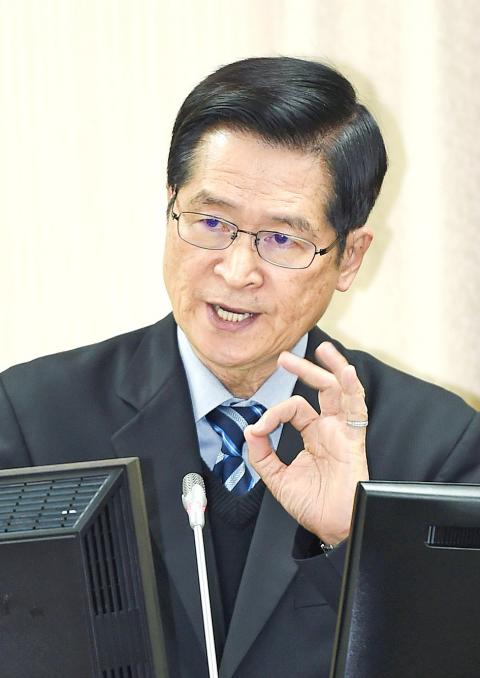The nation’s armed forces can hold the line against China’s People’s Liberation Army (PLA), Minister of National Defense Yen De-fa (嚴德發) yesterday told the Legislative Yuan’s Foreign Affairs and National Defense Committee.
During a question-and-answer session, Yen was asked to evaluate the comparative military capabilities of Taiwan and China, three days after President Tsai Ing-wen (蔡英文) told CNN that Taiwan was “capable of holding off any first waves of attacks” by China.
Democratic Progressive Party (DPP) Legislator Lo Chih-cheng (羅致政) asked what the military’s capabilities were to respond to a PLA “first strike,” and whether it had the ability to mount a pre-emptive strike against China.

Photo: Fang Pin-chao, Taipei Times
The nation’s two-staged military doctrine is to enact force protection, followed by the deployment of combat power, Yen told Lo.
“For force protection, we must be capable of absorbing the first strike, so critical and dependable forces are mechanized, and they will not stay still for the enemy to hit,” he said. “For deploying combat power, we will use counterattacks and early suppression of the enemy, as well as other actions.”
“As for pre-emptive capabilities, we possess them, but we are not at liberty to discuss them,” he said.
However, he added that those capabilities are for creating a multi-layered deterrence, not for launching first strikes.
When DPP Legislator Wu Kun-yuh (吳焜裕) asked Yen to elaborate on the national military doctrine, the minister said Taiwan was not engaged in an arms race with China and the military relies on quality to overcome quantity.
To augment force protection, the ministry is working with local governments to mobilize assets necessary to protect military installations against Chinese guided missiles, in conjunction with concealment and mobility measures, he said.
The armed forces would deploy mobile and decisive weapons systems to fight at the place and time of its choosing, with an emphasis on using the terrain to maximize asymmetric warfare capabilities in the counter-air, counter-naval and counter-amphibious operational phases of such a war, Yen said.
Chinese Nationalist Party (KMT) Legislator William Tseng (曾銘宗) asked Yen to gauge the time the military could hold out against the PLA, and what the armed forces would do if war broke out as the result of political conflict between independence and unification factions.
While the military does not quantify defensive time frames for doctrinal reasons, “we have full confidence and capability to stay on top of regional developments and defend our homeland,” Yen said.
The military’s core value is its constitutional duty to defend the Republic of China and the citizens residing within its domain, he said.
The US is certain to intervene if regional security developments threaten its national interests and Japan could possibly be involved, he said, adding that the ministry could not speak for the intentions of the Philippines.

US President Donald Trump yesterday announced sweeping "reciprocal tariffs" on US trading partners, including a 32 percent tax on goods from Taiwan that is set to take effect on Wednesday. At a Rose Garden event, Trump declared a 10 percent baseline tax on imports from all countries, with the White House saying it would take effect on Saturday. Countries with larger trade surpluses with the US would face higher duties beginning on Wednesday, including Taiwan (32 percent), China (34 percent), Japan (24 percent), South Korea (25 percent), Vietnam (46 percent) and Thailand (36 percent). Canada and Mexico, the two largest US trading

China's military today said it began joint army, navy and rocket force exercises around Taiwan to "serve as a stern warning and powerful deterrent against Taiwanese independence," calling President William Lai (賴清德) a "parasite." The exercises come after Lai called Beijing a "foreign hostile force" last month. More than 10 Chinese military ships approached close to Taiwan's 24 nautical mile (44.4km) contiguous zone this morning and Taiwan sent its own warships to respond, two senior Taiwanese officials said. Taiwan has not yet detected any live fire by the Chinese military so far, one of the officials said. The drills took place after US Secretary

CHIP EXCEPTION: An official said that an exception for Taiwanese semiconductors would have a limited effect, as most are packaged in third nations before being sold The Executive Yuan yesterday decried US President Donald Trump’s 32 percent tariff on Taiwanese goods announced hours earlier as “unfair,” saying it would lodge a representation with Washington. The Cabinet in a statement described the pledged US tariffs, expected to take effect on Wednesday next week, as “deeply unreasonable” and “highly regrettable.” Cabinet spokeswoman Michelle Lee (李慧芝) said that the government would “lodge a solemn representation” with the US Trade Representative and continue negotiating with Washington to “ensure the interests of our nation and industries.” Trump at a news conference in Washington on Wednesday announced a 10 percent baseline tariff on most goods

THUGGISH BEHAVIOR: Encouraging people to report independence supporters is another intimidation tactic that threatens cross-strait peace, the state department said China setting up an online system for reporting “Taiwanese independence” advocates is an “irresponsible and reprehensible” act, a US government spokesperson said on Friday. “China’s call for private individuals to report on alleged ‘persecution or suppression’ by supposed ‘Taiwan independence henchmen and accomplices’ is irresponsible and reprehensible,” an unnamed US Department of State spokesperson told the Central News Agency in an e-mail. The move is part of Beijing’s “intimidation campaign” against Taiwan and its supporters, and is “threatening free speech around the world, destabilizing the Indo-Pacific region, and deliberately eroding the cross-strait status quo,” the spokesperson said. The Chinese Communist Party’s “threats